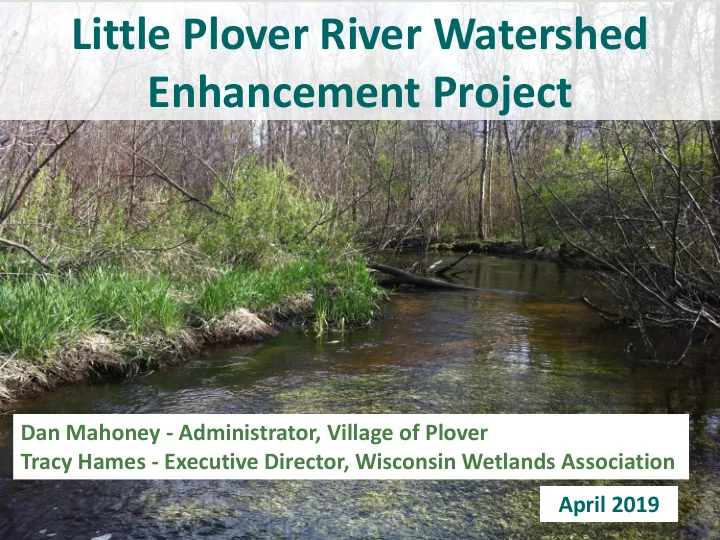

Little Plover River Watershed Enhancement Project Dan Mahoney - Administrator, Village of Plover Tracy Hames - Executive Director, Wisconsin Wetlands Association April 2019
Little Plover River Watershed
Long History of Study & Controversy
Vision Improve the health of the LPR and the quality of life of the surrounding community. Use best available data and voluntary conservation actions.
Goals • Improve LPR flow & aquatic health. • Improve surface-groundwater connections & water retention. • Alleviate flooding. • Improve & expand habitat & recreation opportunities.
LPRWEP Partners
Community Leadership
Watershed Perspective Upper 80% of Water Ephemeral Riparian/Riverine Wet Meadows Middle Floodplain Sediment transport Riparian/Riverine Alder/Shrub Carr Lower Depositional Estuaries Marshes Shoreline Wetlands
Groundwater Model
Flow Restoration Plan • Dozens of wells affect flow. • Closer wells have more impact. • Prioritizing actions by location / benefits. • Groundwater model quantifying flow increases. Depletion potential from MODFLOW (WGNHS & USGS)
Potential Flow Restoration Actions • Village well operation changes. • Transitioning irrigated agricultural land to conservation areas. • Additional agricultural irrigation changes. • Other actions.
NRCS RCPP
Implementation
Habitat Projects
Historical Perspective
Upland Grassland Restoration
Upland Forest Restoration
UWSP Forestry Students
Pine and Oak Barrens
Thinning and Invasives Removal
Channel & Floodplain Restoration Wooded: wide & shallow Open: narrow & deep
Historical Perspective - Wetlands 1937 2016
Wetland Restoration - Soik
Historical Perspective – Flow Paths 1937 2016
Soik Property – Ditch Fill
Channel Width – Floodplain Disconnection Reference Reach East of Kennedy Impacted Reach West of Kennedy
Channel Shape East of Kennedy Requires 5 cfs to interact with floodplain
Channel Shape West of Kennedy Requires 45 cfs to interact with floodplain
1960 Discharge peaked at 50 cfs. Took 2 months to come back to baseflow
1984 Discharge peaked at 75 cfs. Took 1 month to come back to baseflow.
2016 Discharge peaked at 70 cfs. Took 10 days to come back to baseflow.
Reshape channel morphology so the stream interacts with its floodplain more frequently. Based on 1.5 year recurrence interval that would be 25-30 cfs.
Forest Restoration – Floodplain
Historical Perspective - Forest Habitat 1937 2016
Main Channel – Alder Removal
Main Channel – Volunteer Work Days
Before After
Main Channel – Alder Bundling
Main Channel – Narrow Channel
Thank You! LPRWEP Partners: Village of Plover Portage County WPVGA WWA WWF MARS WDNR UWSP
Recommend
More recommend